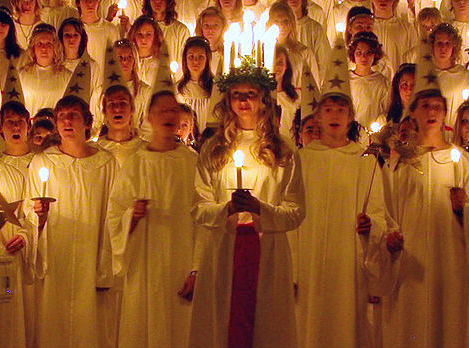
If you’ve every seen a woman holding her eyes on a plate, you’ve probably met St. Lucy. If that image is a little too macabre for your taste, maybe picturing a young girl crowned with a wreath of candle-fire is more appealing? There is something fierce about both images. That is as it should be. I would like to offer a double reflection this week: St. Lucy of Syracuse and newly Blessed Isabel Cristina, two remarkable women, two young people killed, and two millennia in which things have not changed as much as they should have.
St. Lucy: Light in Advent

In the middle of Advent every year, as the nights grow longer, many celebrate a festival of light in honor of a saint whose name—Lucy or Lucia—literally means “light.” She lived in the Roman Empire at a time when being a Christian could get you killed. Her father having died, Lucy’s mother arranged for her to marry a man of influence to ensure her a male protector. She offered a considerable dowry (marriage gift of money) to the man to secure the match.
That marriage was the opposite of what Lucy desired. The man was a pagan. Lucy wanted the freedom to follow Christ independently and already had thrown herself into a life of charity. Unlike some other Roman marriages, Lucy managed to sway her parent. Not only did her mother call off the marriage but the two women also gave the dowry away to the needy.
The spurned groom refused to accept Lucy’s “No.” He sought revenge whether out of a feeling of humiliation or anger at losing the dowry. Using his knowledge of her faith, he denounced her to the Roman authorities and ensured her execution. Later Christians elaborated on those facts, creating stories of torture and of her heroic endurance including the gouging out of her eyes (making her the go-to saint for intercessions if you have eye problems).
The man’s name has been lost; Lucy’s endures. The Scandinavians have honored her for centuries by having girls—dressed in white with a red martyr’s sash and a halo of candles—giving special “Lucia-cakes” to the needy or (later) friends in memory of Lucy’s charity. This combination of light and charity marked the beginning of Christmas celebrations and the turning from cold and dark (which literally reach their peak in subarctic Decembers) to a new light and love.
Blessed Isabel Cristina: A Modern Martyr of Sexual Assault
Warning: the story of Isabel Cristina contains an account of attempted sexual violence.
Just before the feast of St. Lucy this past week, I read an announcement that took my reflections on her in a new direction. On December 10, the Church officially recognized Isabel Cristina Mrad Campos as a modern martyr and gave her the title Blessed.
That young Lebanese-Brazilian woman loved God and people. Her teachers noticed how she, even as a young schoolgirl, always was helping fellow students with disabilities. Her parents actively supported the St. Vincent de Paul Society, an international Catholic organization for helping the poor, and Cris (as she liked to be called) soon joined them. She had a particular love for helping children and the elderly. She dreamed of being a pediatrician and maybe serving in poor areas of Africa. In the meantime, she balanced prayer with a normal teenage social life hanging out with friends and at least one serious boyfriend. While dating, she stayed a virgin (as her postmortem confirmed), saving that intimacy for her future marriage.

In 1982, at age 20, Cris moved into an apartment with her brother in a new city to study for entrance exams to med school. She chose the apartment for two reasons: its proximity to school and its proximity to a chapel where she could pray in front of the Eucharist. While there, she hired a local workman to assemble a cabinet. The man started flirting with her and became angry when she rejected his advances. He returned to the apartment the next day when her brother was gone and attempted to rape her. When she resisted, he stabbed her fifteen times, killing her.
Two Witnesses: Saying No and Saying Yes
Cris’ beatification shocked me into looking at Lucy again. I say “shocked” because it forcibly struck me how scandalous it is that, despite seventeen-hundred years of Christian culture since Lucy, a woman can still be killed by a man simply because she said “No.” The fact that our culture has a problem here is not, of course, news. I know at least three survivors of sexual assault; sadly, all of us probably know many survivors and have seen their scars. Activists talk about a “rape culture.” How do we excuse the continued toleration of a continuum of behavior from the sexual objectification of women to institutions protecting perpetrators of assault?
The Church officially recognizes Isabel Cristina (and a handful of women like her) as a martyr “in defense of chastity,” and that is something new. The word “martyr” is a Greek word for “witness”; the Church uses it for those who died for their faith because their choice to remain faithful testifies to an ultimate trust in God’s eternal love. The one who knowingly kills the martyr does so in hatred of God and the faith. Lucy is obviously a martyr—though denounced because she rejected a man, the government executed her for being Christian. Cris’ killer, though, attacked her simply because she was a woman who had the temerity to tell him, “No.” So in what sense is the Church calling her a Christian martyr? What point is the Church making?
That fact that both women died as virgins doesn’t make them martyrs. Cris would likely have married and been no less holy. Her would-be rapist could never have defiled that holiness no matter what he did. Both women are witnesses to God because both chose a life that said a profound “Yes.” They said yes to loving God and their neediest neighbors. In each case, that life brought them into confrontation with violent, controlling men who saw their beautiful “yes” as worthless compared to the men’s own pride.
Virginity is still important. Both women fought for it. That virginity was, however, part of their bigger “yes.” Preserving their right to say “no” to a man gave them the freedom to focus on serving others in the present. It also gave them the freedom to say “yes” with their bodies in the future to someone they truly loved. For Lucy, giving her whole body to God was to be an offering to Jesus at their joining in heaven. For Cris, it is to be a special love reserved for her future husband, a physical declaration of an intimacy reserved for them alone.
The Church, in declaring Cris a martyr for chastity, honors her choice. And the Church’s honor of Lucy and Cris makes one clear point to the public: a man who attacks a woman’s dignity in her body and sexuality, hates and attacks God.


